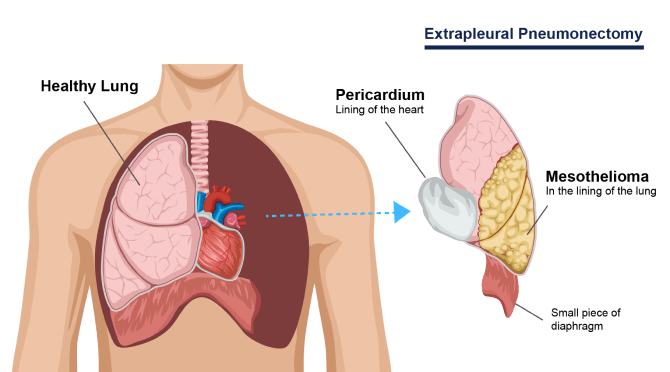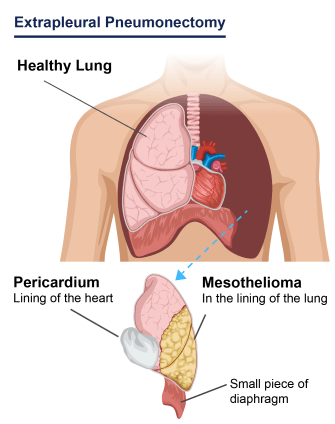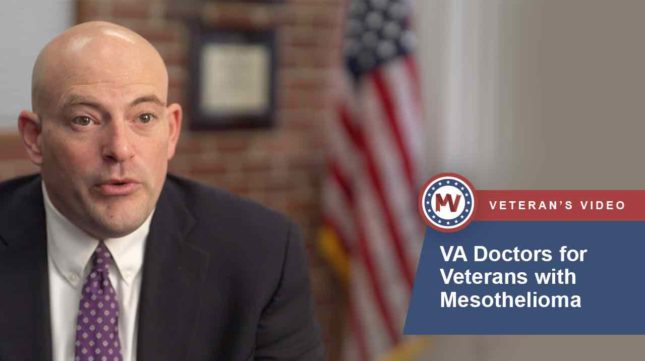Extrapleural pneumonectomy (EPP) is a standard surgery for pleural mesothelioma patients. During EPP, surgeons remove the affected lung, surrounding diseased tissues, and partial organs. EPP can extend patients' survival rates, prevent cancer recurrence, and improve their quality of life.
Understanding the Extrapleural Pneumonectomy
Extrapleural pneumonectomy (EPP) is a thoracic surgery performed to treat pleural mesothelioma — a rare cancer that affects the lining of the lungs (pleura). EPP is considered a radical surgery, but it is one of the most effective ways to extend the life expectancy of patients with pleural mesothelioma.
The late Dr. David Sugarbaker developed the EPP procedure, modifying existing lung-removal techniques to make them more effective for mesothelioma patients. Dr. Sugarbaker was one of the first surgeons to make a significant breakthrough in mesothelioma treatment, and his EPP surgery remains a standard in the treatment of malignant pleural mesothelioma.
Unlike the pleural mesothelioma surgery pleurectomy with decortication (P/D), the EPP procedure involves removing the diseased lung. In some cases, the pleural lining of the other lung, pericardium (lining of the heart), and part of the diaphragm may also be removed. Numerous studies have proven that the treatment option extends overall survival time.
Most patients who receive an EPP have early-stage pleural mesothelioma, which means that the cancer has not spread to distant lymph nodes and other parts of the body.
The ideal patients are healthy enough to recover from the surgery. Losing a lung is an intensive experience that requires a lengthy recovery period, and preoperative heart and lung tests will help confirm whether a person can handle the physical toll.
In some cases, late-stage mesothelioma patients may be able to undergo an EPP. Doctors determine whether individuals have the overall health required for this surgical treatment.
Patients can receive EPP surgery from specialized mesothelioma doctors at cancer centers nationwide.
Veterans may receive EPP surgery and other mesothelioma treatments at VA hospitals if they are enrolled in the VA Health Care System. Veterans with mesothelioma can receive other benefits through the VA as well.
If you have been diagnosed with mesothelioma, you should discuss any questions or concerns with a doctor. Use our Doctor Match to find the best specialist near you.
EPP Eligibility
An EPP is an aggressive procedure, and there is a strict set of criteria for patients who can receive the surgery. Doctors prefer to operate on patients with stage 1 or 2 pleural mesothelioma and will consider a patient’s overall health outside of their cancer.
Doctors will consider whether patients can perform basic tasks and care for their own needs. Patients who are mobile and functional are significantly more resilient to surgery. Tests are also performed on the heart and lungs to determine whether their function can support surgery.
Some tests your doctor may run before EPP include:
- PET or CT scan: These imaging scans help doctors see where your disease is. It’s important to know the exact location of the tumors before surgery. These scans can also reveal if your mesothelioma is too advanced for surgery.
- Mediastinoscopy: This procedure uses a camera to examine the center of the chest. Doctors want to see if mesothelioma has spread to the other side of the chest and is inoperable.
- Lung function tests: Your lungs must be in working order to recover. These tests can be as simple as breathing through a tube. In another test, the patient inhales a small amount of radioactive gas to help doctors see the active airways in the lung.
- Echocardiogram: This 30-minute procedure uses sound waves to measure your heart. A machine measures how strong your heart is. A strong heart is necessary for any surgery.
- Blood tests: Doctors need to know your blood chemistry before an EPP. They measure your red and white blood cell counts.
- Performance tests: These tests provide information about your lung and heart health. Performance tests measure how long you can exercise and how your organs hold up in the process. You may walk on a treadmill or pedal a stationary bike while you wear a mask that measures your breathing. Other devices measure your heart rate and blood pressure.
Each surgeon or cancer center may have its own set of criteria for patient selection. For example, one cancer center may have age restrictions, while another center may care more about your overall health. If you’ve been deemed inoperable due to your age, you may want a second opinion.
If you are a veteran interested in meeting with a mesothelioma specialist at a facility managed by the U.S. Department of Veterans Affairs (VA), our free Veterans Packet features information regarding treatments and benefits. Request your copy today.
EPP Surgery
Before receiving an EPP, patients need to prepare. Mesothelioma specialists will create a clear plan with prerequisite activities that patients must follow before surgery. Patients should take the time to understand and follow every step in preparation. Shortly before surgery, a pre-admission check-up will be performed to confirm a patient’s complete health profile.
On average, a patient can double their life expectancy from 12 to 24 months with EPP. Some patients have gone on to live 5 or more years due to their EPP surgery.
In some cases, doctors may administer chemotherapy to shrink tumors before surgery. Immediately before surgery, a patient will receive an intravenous catheter that will deliver general anesthesia, fluids, and medications. Once you’re asleep, a doctor will use a bronchoscope to look into your lungs and confirm surgery is possible.
An EPP can be performed in as little as three hours, although some surgeons take longer, and the time increases if the mesothelioma is difficult to resect (remove).
The EPP surgery itself has several steps:
- Step 1: During the surgery, a large incision is made with immediate removal of the sixth rib. This incision opens up the surgical space and allows doctors to see where the mesothelioma is.
- Step 2: Doctors separate the pleural and pericardial linings from the chest wall.
- Step 3: Doctors collapse the lung. They clamp off major blood vessels, nerves, and the bronchial tube leading to the affected lung.
- Step 4: Doctors remove cancerous tissue. They take out the pleural and pericardial linings. They also remove the lung and part of the diaphragm. They patch up these areas with artificial materials.
- Step 5: Doctors inspect the lung cavity for signs of cancer. When they see no more, they close the incision with sutures. A tube is placed in the chest cavity to drain fluid and blood buildup. The drain is removed when it no longer produces fluid.
After surgery, patients need to take care of themselves physically and mentally. Poor appetite, short-term depression, constipation, and pain are all common symptoms after EPP surgery.
The hospital will provide tips for coping with these symptoms, but patients should speak up if they have recovery concerns at any point.
EPP and Multimodal Treatment
An EPP is most effective when it's combined with other mesothelioma treatments. Using two or more treatments simultaneously is called multimodality therapy. This approach has become a common practice in mesothelioma care.
Traditionally, chemotherapy and radiation therapy are the two standard treatments used with EPP. This trimodality therapy has been proven to extend patient survival for months or even years.


The late Dr. Sugarbaker’s research has also led to new ways of incorporating chemotherapy in EPP, including intraoperative chemotherapy.
With intraoperative chemotherapy, a chemotherapy solution is applied to the surgical site immediately following EPP surgery. The goal is to destroy microscopic mesothelioma cells that remain after removing the visible tumors and lining.
Use our Doctor Match to find the best doctor near you.
Extrapleural Pneumonectomy Recovery Times
Patients who undergo EPP take several weeks to several months to recover. They are typically hospitalized for the first 7-10 days of recovery. After this hospital stay, patients may be cleared to recover at home.
At-home care is an integral part of recovery. Patients are asked to shower daily, keep their incisions clean, and support their recovery with nutritious meals and beverages. Pain should be expected, especially as activity levels increase, and patients will be prescribed medication for pain management.


Typically, EPP patients cannot work or lift more than 10 pounds for at least 4-6 weeks. Patients also shouldn’t drive until they stop taking pain medication.
Additional time will be required for a patient to adjust to life with only one lung. Patients should not swim or participate in sports for at least 2 months and must ease back into those activities when they are finally ready.
In some cases, EPP surgery leads to immediate or long-term complications and risks, which can lengthen recovery time. It’s important that EPP patients are prepared to take the additional time to recover, if necessary, to prevent any potential EPP risks.
EPP Risks
All surgeries have risks, and an EPP is no exception. Because EPP is an invasive and intensive surgical procedure, serious complications can occur during or after the surgery.
Some of these complications include:
- Respiratory failure
- Empyema (a buildup of infected fluid within the pleural space)
- Internal bleeding
- Blood clots or deep vein thrombosis (DVT) in the lower legs that can travel to the lungs
- Pneumonia
- Death due to complications of surgery
According to the American Cancer Society, 1 in 3 patients who undergo surgery may have major complications, including death. However, 87.5% to 96.8% of patients survive more than 30 days after EPP surgery.
Surgical complications can appear during surgery, while recovering in the hospital, or during at-home recovery. For example, a person may bleed out during their operation, experience a blood clot during post-op recovery, or contract pneumonia at home.
Patients should discuss normal and abnormal symptoms with their surgeon and know what to do if an unexpected symptom appears.
Veterans who served in the U.S. military may be eligible to receive VA benefits. Learn more about these benefits and see if you qualify.
- VA Disability Claims
- Survivor Benefits
- Finding Veteran Doctors
EPP Benefits
Despite the risks, EPP is one of the best treatments for patients with pleural mesothelioma. Some have even called it the "gold standard" of treatment. EPPs provide patients with their best chance at increasing their lifespan.
Many pleural mesothelioma patients also experience relief from their existing symptoms. An EPP removes the diseased lung and all visible tumors, which can also minimize or eliminate symptoms that the cancer was causing.


As a result, pleural mesothelioma patients who have undergone the EPP procedure live longer with an improved quality of life.
EPP Survival Rates
The average survival rate after an EPP is 7-47 months, but many patients exceed these statistics. It isn’t unheard of for patients to live 5 or more years after EPP surgery.
Patients with pleural mesothelioma have the best chance of long-term survival using the trimodal approach and combining EPP with chemotherapy and radiation.
In one of Dr. Sugarbaker’s studies, patients who received intraoperative chemotherapy lived over 1 year longer than patients who didn’t receive the treatment. The median survival for the patients with intraoperative chemotherapy was 35.6 months, with half of those patients living even longer.
Cancer researchers continue to make breakthroughs regularly. Patients with pleural mesothelioma who undergo the EPP procedure will have access to treatments in the future that will extend their lifespan even further.
Getting an EPP
Patients can undergo EPP performed by specialized mesothelioma doctors at cancer centers across the country. These specialized doctors are highly experienced in mesothelioma cases and are leading mesothelioma researchers.
Video Summary: VA-accredited Attorney Eric Hall explains how the Mesothelioma Veterans Center can help you find a mesothelioma specialist in the VA. Some of the world's top mesothelioma doctors have partnered with the VA to treat veterans with mesothelioma. Call (877) 450-8973 to get started. View Transcript
There are several world-renowned doctors that work with the VA to treat mesothelioma. The VA will recognize any asbestos-related disease, as long as your asbestos exposure happened while you were on active duty in the military.
If you have questions about mesothelioma treatment, we encourage you to reach out to the Mesothelioma Veterans Center to speak with our nurses on staff, who can talk to you about the various treatments and connect you with world-renowned doctors who treat mesothelioma.
It’s essential for patients to receive specialized treatment for their mesothelioma. Mesothelioma is a rare and unusual form of cancer, and general oncologists may not know how to diagnose or treat it. Misdiagnosis is common with mesothelioma and has devastating consequences.
Mesothelioma cancer teams can help guide patients through every step of the preparation, treatment, and recovery process. These teams are comprised of people who are highly familiar with mesothelioma and can provide the highest quality care possible.
Anyone with pleural mesothelioma can access civilian cancer centers in the United States. However, special programs specifically for veterans can only be accessed through VA hospitals.
EPP and the VA Health Care System
![]()
![]()
Veterans have options and can receive EPP through private cancer centers or the VA Health Care System. In many cases, the VA system is an ideal choice for patients because it streamlines processes and can connect patients to other helpful resources.
Learn More About Getting an EPP
The Mesothelioma Veterans Center can help patients learn more about the EPP procedure and other medical treatments to improve their lifespan. We help patients assess their options and develop a plan of action.
FAQs About Extrapleural Pneumonectomy (EPP)
How effective is an EPP procedure?
The efficacy of an EPP procedure depends on each individual patient. However, patients who undergo this surgery typically double their life expectancy from 12 months to 24 months. In some cases, patients who had an EPP lived for several years following their surgery.
What should I expect during recovery from EPP?
Recovering from an EPP procedure can take several months. The first week is typically spent at the hospital, followed by weeks of at-home recovery.
During the EPP recovery period, patients are asked to maintain proper hygiene and eat well-balanced meals. Patients can also discuss pain management options with their doctor, as experiencing pain during recovery is to be expected.
What is the survival rate for an EPP?
On average, the EPP survival rate is between 7 and 47 months. However, this surgery has helped some patients live for 5 years or longer.






